
Banner
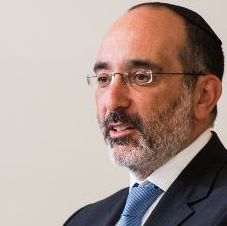
This will open your eyes to Torah Law
Published
7 years agoon
By
adminANT KATZ
After being introduced by the university’s dean of the law faculty and another professor, Rabbi Goldstein was called on to speak. “My lecture focused on how Torah law protects the most vulnerable.”
The Chief Rabbi said: “We live in confusing times, dangerous times, and times filled with tremendous opportunity and it is times like these that we need to turn for insight to Jewish law.”
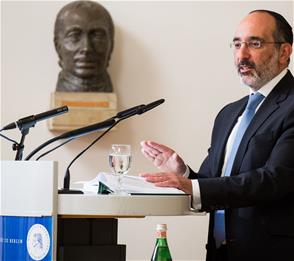 Quoting from a question posed by the late Chief Rabbi of Israel, Rabbi Isaac Halevi Herzog, Rabbi Goldstein said: “When the Book of Deuteronomy says: ‘I place before you’, and that someone will say that these laws are righteous laws, ‘how do we define righteousness?’
Quoting from a question posed by the late Chief Rabbi of Israel, Rabbi Isaac Halevi Herzog, Rabbi Goldstein said: “When the Book of Deuteronomy says: ‘I place before you’, and that someone will say that these laws are righteous laws, ‘how do we define righteousness?’
RIGHT: Rabbi Goldstein delivering his hour-long lecture
“I think this school of Jewish law here is doing such important and outstanding work in continuing this tradition of teaching about Jewish law because it has so much to offer,” said the chief rabbi.
Quoting from the introduction to Herzog’s two-volume English tome, he, Rabbi Goldstein, had written, he said: “It has been my ardent striving throughout to afford the general student of jurisprudence at least an elementary conception of the elaborate mass of towering structure of the Jewish law.”
Goldstein said he found it “moving to deliver a lecture at Humboldt” as they have, at their entrance, a plaque such as those affixed to all houses in the city from where the Nazis had expelled Jews;
Rabbi Goldstein said that what Herzog had written so many years ago – on the importance of Jewish law and what it has to offer – was important and relevant today.
“It is indeed an ancient system of law that has formed the base of so much of Western tradition and yet had been ignored not only because of generations of prejudice, but also because its sources have been written in Hebrew and Aramaic and have been inaccessible to many people,” said Goldstein.
Again quoting Hertzog’s forward, he said: “When its literary sources have been made more accessible and its accumulated treasures of the ages have been laid bare, the world jurist may yet come to realise that the utter neglect of Jewish law on the part of students of law and the cultured persons generally have meant a serious loss to the progress of humanity.”
Understanding Jewish law advanced society
And so, says Goldstein, the work of promoting and understanding Jewish law advanced the society in so many ways. And, specifically, in the area of morality because Jewish law has stated from the beginning. “The Book of Deuteronomy says: ‘You shall safeguard and perform them for it is your wisdom and insight in the eyes of the people who shall hear all of these statutes and say: surely a wise and insightful people is this great nation and which this nation has righteous laws and statutes such as this entire Torah that I place before you today’.”
The Book of Deuteronomy makes a very important claim, says Goldstein, as it describes the laws of the Torah as righteous laws and statutes. “And there is a very interesting word: righteous.” Because it is making a claim about law, he says, it is calling for the righteousness of law, not only the structure and the order.
“What does the legal system provide a society? A legal system provides a society with order, with structure, with predictability with a way of governing the affairs of human beings in a manner which is dignified and which is structured and ordered,” he told his esteemed audience in Berlin.
The chief rabbi also quoted from Rabbi Mordechai Gifter, one of the leading American Talmudic scholars of the 20th century, who described the “quintessential distinctive dimension of Jewish law. (Gifter) says as follows: ‘The law itself can become cold and sometimes even cruel if it is designed only to meet the requisites of an ordered society’.”
As a South African, he said he knew this because “the apartheid regime structured its oppression of South African society through the legal system.”
He went on to compare having a very advanced legal system, with elaborate statutes and courts and lawyers and legal departments – where all of those tools were actually just tools of oppression because it brought order to society, but no righteousness and no morality.
“And, of course, there was a similar experience here in Germany with the Nazi regime of Adolf Hitler, who also used laws, the Nuremberg laws, where it was the methodology of law which was used as a tool of oppression.”
Goldstein told his audience that he would like to explore with them “an understanding of Jewish law” and to try and find the essence of what morality is about. “If we are to define what is the defining essence of morality,” he asked, “what would that be? What is the essence of righteousness?
“When the Book of Deuteronomy says: ‘I place before you,’ and that someone will say that these laws are righteous laws, how do we define righteousness?”
Case-based and practical methodology
Rabbi Goldstein said the methodology he would like to use is a methodology which is “very case-based and practical.” As many legal scholars know, he said, there are different legal systems in the world that have different approaches.
He referenced the Continental legal systems that derive from the Roman-Dutch tradition and the Anglo-American system. The latter is often case-based, he said, while Roman-Dutch tradition talks more about principles.
“The Jewish tradition is very much practically based.” He said, A student of Talmudic law will know that in the Talmud one encounters real life examples – and it is from those examples that the general principles have to be derived and extracted.
Thus, said Rabbi Goldstein, “if we are to define and extract the essence of the definition of what is morality, what is righteousness, then we need to delve into the practical cases of Jewish Law and try to extract from it.
“There are four particular cases that I would like to place before you, which are essentially a puzzle. There are four specific examples that I want to share with you only in brief terms. We won’t be able to go into the full depth of each example. But just to give the outline of the examples,” he said.
The specific examples that Rabbi Goldstein dealt with were…
NUMBER ONE – THE ISSUE OF RAPE AND MARRIAGE:
He said he found it “interesting that in Western law, for generations, and going back right to the time of Roman law and all the way through,” there had been a general acceptance that it is not considered a crime for a man to rape his wife.
The various legal systems have different reasons for this, he says. “In the Anglo tradition, it is because at the moment of marriage irrevocable consent is given, in the Roman-Dutch tradition it is because the wife is considered to be the property of her husband.”
Rabbi Goldstein delivered his lecture the day after a terror attack killed four servicemen in Israel. “After the lecture,” he says, “somebody mentioned that the Israeli flag was projected on the Brandenburg Gate – which he then visited on his way to a dinner.
STORY CONTINUES BELOW PICTURE…
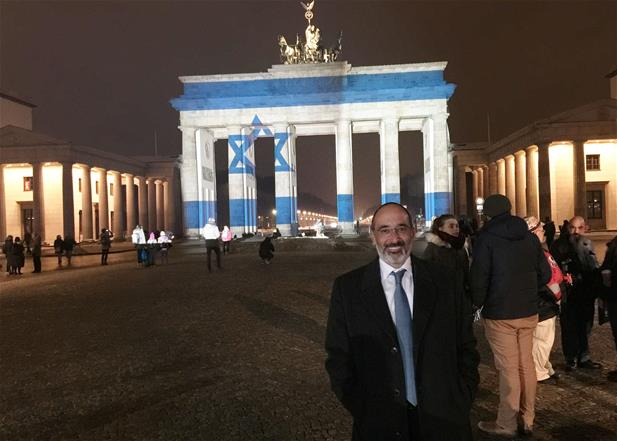
ABOVE: On the day before Rabbi Goldstein delivered his lecture, a terror attack took place in Jerusalem which killed four IDF soldiers. After delivering his lecture, the chief rabbi was told that Berlin had emblazoned the Israeli flag on the famous Brandenburg Gate, paying tribute, as it did after Brussels, Istanbul terror attacks. The picture, above, shows Rabbi Goldstein stopping to visit the Gate (in his winter woolies and all) on his way to the dinner that was hosted in his honour afterwards.
This dispensation, said Rabbi Goldstein, where marital rape is not considered a crime, continued up to the end of the 20th century. He quoted three examples which this report will paraphrase briefly:
A fascinating case that happened in Israel, State vs. Cohen. Mr Cohen was called before the court for the crime of raping his wife in 1981. Cohen’s defence had been that the modern state of Israel did not have Jewish law as its primary legal code – it has adopted a combination of English and Turkish law (but does allow at times the introduction of elements of Jewish law within the legal system). Cohen said his actions legal as he was basing himself on English law that allowed rape in marriage even in 1981. The prosecution argued that in terms of Jewish law, it is a crime because it is completely forbidden in the context of Jewish law for a man to rape his wife. The court brought in Jewish law and overturned English law. From then on the law of the State of Israel would be that it would be illegal for a man to rape his wife based on Jewish law.
NUMBER TWO – A POLITICAL EXAMPLE:
Western tradition until the French revolution and the American constitution was very much one of the exercise of absolute political power. Which meant that a king or a ruler, an emperor of a state was given absolute power to govern in the way that he saw fit. Rabbi Goldstein said he wasn’t talking about “a notion of democracy” but rather about a more fundamental question. A person who exercises political power, whether as a result of democracy or some other method of election: “How is that power exercised?” The modern concept arose from the time of the French revolution and then more specifically the American constitution, he said, and “that is the notion of a separation of powers.” Executive, Legislative and Judicial Power is separated from one another. The person who wields executive power is not the final authority within a society. And yet, Rabbi Goldstein said, this notion of a separation of powers is an ancient one in Jewish law and it was always there. It is ultimately the judges, the Sanhedrin, who are the final authority within a society and that is such an important part of maintaining freedom within a society.
NUMBER THREE – JUDICIAL TORTURE:
“Torture is a controversial topic today,” said Rabbi Goldstein, but the controversies are generally about police torture. Where torture is used as a tool of extracting information from an accused. Rabbi Goldstein said time did not allow the discussion of present-day concepts of using torture in cases of terrorism.
Western law, however, had always accepted a concept which is called judicial torture said Goldstein. From the time of Greek and Roman law, in England and throughout Europe – it was accepted that a judge could order a criminal accused to be tortured to extract a confession and that confession would be admissible in court. Judicial instructed torture was on the statute books and there for all to see.
Report continues after the following sidebar…
Chief Rabbi Goldstein spoke about South Africa too:
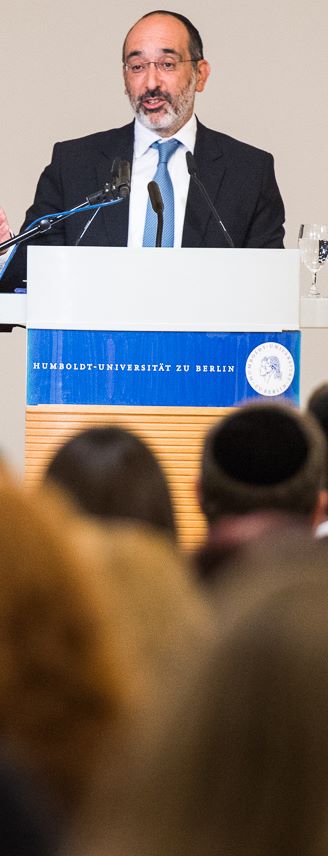 “In fact, in South Africa at the moment we have seen that in action. Because South Africa is a relatively young democracy, one of the big battles has been holding the president accountable to the values of the constitution. And it’s been a remarkable victory of the new South Africa, which is such a young democracy which was only established in 1994, and yet has been stretched to its limit, where president Jacob Zuma was subjected to an inquiry about the public protector concerning the allegations of corruption that he was perpetrating and the public protector made findings; the president ignored the findings and the opposition parties took the president to the constitutional court and asked the constitutional court to order the president to accept and to live by the findings of the public protector which is in fact what happened. The court found the president in violation of the constitution, in violation of the authority. The public protector ordered the president to pay back the money that he had taken unlawfully and to fulfill all of the requirements of the public protector which he has done. And so that was a great victory for democracy, but you can see and is something that we, South Africans, have experienced first-hand, the importance of having a separate and independent judiciary, a separation of powers and to ensure that absolute power is not in the hands of a single individual, but that has always been the approach of Jewish law and, so once again, that’s the second example that we have which is an example of how Western law went on one tradition for thousands of years. Jewish law always took another position and now, in modern times, Western law has come around to the position of the Jewish law, and the question that I’m placing before you is what is it in Jewish law that drove it to these answers, answers which the world has come to only in recent times?”
“In fact, in South Africa at the moment we have seen that in action. Because South Africa is a relatively young democracy, one of the big battles has been holding the president accountable to the values of the constitution. And it’s been a remarkable victory of the new South Africa, which is such a young democracy which was only established in 1994, and yet has been stretched to its limit, where president Jacob Zuma was subjected to an inquiry about the public protector concerning the allegations of corruption that he was perpetrating and the public protector made findings; the president ignored the findings and the opposition parties took the president to the constitutional court and asked the constitutional court to order the president to accept and to live by the findings of the public protector which is in fact what happened. The court found the president in violation of the constitution, in violation of the authority. The public protector ordered the president to pay back the money that he had taken unlawfully and to fulfill all of the requirements of the public protector which he has done. And so that was a great victory for democracy, but you can see and is something that we, South Africans, have experienced first-hand, the importance of having a separate and independent judiciary, a separation of powers and to ensure that absolute power is not in the hands of a single individual, but that has always been the approach of Jewish law and, so once again, that’s the second example that we have which is an example of how Western law went on one tradition for thousands of years. Jewish law always took another position and now, in modern times, Western law has come around to the position of the Jewish law, and the question that I’m placing before you is what is it in Jewish law that drove it to these answers, answers which the world has come to only in recent times?”
Jewish law has never accepted judicial torture
Not It was important to understand, said Rabbi Goldstein, that he not talking about police-driven torture, bat rather judicial torture, “where a judge actually instructs it.”
The contrast with Jewish law is fascinating, he says, as Jewish law not only never accepted judicial torture, Jewish law rules that a confession, even a voluntary confession given without any pressure is inadmissible as evidence because it’s regarded to be tainted.
Through the Miranda decision and other famous cases in American and Western law, there is a tremendous emphasis placed on ensuring that there is no coercion of an accused today, so Western law has come around to this position.
“But here is the anomaly,” says Rabbi Goldstein, “we have Western law having a system that accepts judicial torture, Jewish law which doesn’t even accept a voluntary confession.” How’s that so? asks the chief rabbi.
NUMBER FOUR – THE QUESTION OF POVERTY ALLEVIATION:
The final example that Rabbi Goldstein put before his audience, was the question of poverty alleviation. There were laws throughout Europe and in the West and “for many, many centuries that forbade a person to beg for money,” he said. “Laws that actually made it a crime to be homeless!”
As recently as in 18th century France, the law was that a person, a vagrant, in other words a homeless person, an unemployed person was actually branded with a V on their skin for vagabond, and a person who was caught begging illegally was branded with an M from mendicant, a beggar.
And many horrific punishments were inflicted in Britain too – such as the reported case of Ellen Dixon, a blind woman who was whipped and deported in 1635 because she was caught begging. As horrific as this sounds to us today, it was the standard position throughout Western law. And yet, once again, Jewish law took a position which was that if a person puts out their hand you give, unconditionally. Once again, says Rabbi Goldstein, one finds this anomaly, “centuries of Western law in one direction, Jewish law taking a contrarian view.”
On numerous crucial human rights issues, everyone is going in one direction and the Jewish law is going in the other. “You have to ask a question and that is: Why?” says Rabbi Goldstein. “What is at the heart of it?”
The secret principle at the heart of it
The Chief Rabbi continues: “I think if we look at these four cases that I mentioned we will be able to uncover a principle, a principle which is not mentioned specifically by Jewish law.
“The principle I’m about to share with you won’t find it written anywhere because the methodology of Jewish law is not to give broad sweeping principles, but rather as we said before case-based. Looking at specific cases and extracting the principle from the cases,” he explains.
“And what principle can be extracted here I believe a principle that could be called, but it’s my own term, and you won’t find this anywhere in the Jewish law writings as a specific term, but it’s a term that I think is an accurate description of what is going on, and that is ‘the vulnerability principle’,” he says.
By this, explains Rabbi Goldstein, he means Jewish law took a position which is this: “Analysing the situation of who is in the most vulnerable predicament and the responsibility of the legal system is to protect the vulnerable.”
“You find this principle throughout the Torah; you’ll find that in the Talmud council that 36 times the Torah, the Five Books of Moses mention the importance of protecting the stranger, the widow and the orphan. 36 times which is more times than any other commandment is mentioned in the Five Books. You find the importance of protecting the most vulnerable members of the society. In the Hebrew Bible, in the prophets of the Bible, you will find mentions of the importance of protecting the vulnerable and the importance G-d gives to it. For example, you’ll find Isaiah the prophet say ‘learn to do good, seek justice, vindicate the victim, bring the justice to the orphan, take up the grievance of the widow’,” he says.
There are verses throughout the Hebrew Bible that talk about the importance of protecting the most vulnerable member of society. “I believe that if you look at the four examples that I have placed before you,” he told his Berlin audience, they will see that in each example Jewish law seeks to protect the most vulnerable. “And that is why it came out with the correct solution to these problems.”
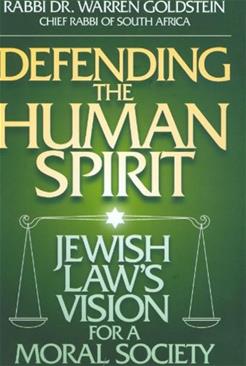 From a Jewish law perspective, righteousness is defined as “Protecting the most vulnerable members of society.” That is the definition of righteousness from a Jewish law perspective. It is what has driven Jewish law since its inception and of course, as Jews, we believe that it was given by G-d at Mount Sinai and he gave this system of law for all future generations to say “this is an eternal principle of righteousness and goodness and morality for all times, the importance of protecting the vulnerable” explained Goldstein.
From a Jewish law perspective, righteousness is defined as “Protecting the most vulnerable members of society.” That is the definition of righteousness from a Jewish law perspective. It is what has driven Jewish law since its inception and of course, as Jews, we believe that it was given by G-d at Mount Sinai and he gave this system of law for all future generations to say “this is an eternal principle of righteousness and goodness and morality for all times, the importance of protecting the vulnerable” explained Goldstein.
RIGHT: Speaking in English, Rabbi Goldstein kept his audience captivated for over an hour. His original doctoral thesis, Defending the Human Spirit, is available from Amazon.com CLICK HERE TO ORDER
What does the vulnerability principle mean for us today?
(While Chief Rabbi Goldstein answered this question using four thousand words during his lecture, JR Online is paraphrasing it down to just headlines)
1) The vulnerability principle gives us understanding of the role of a legal system. If we go back to our original question: “what is the role of a legal system?”
2) A measure to judge the morality of our societies. The laws begin with the laws of the eved ivri, of the servant, that is where the first law given in terms of monetary jurisprudence is the laws relating to the servant. Why? Because the servant is the most vulnerable member of society, and that is the beginning and that is how our society is measured.
3) The vulnerability principle gives us an appreciation for the understanding of the complexity of vulnerability. The Talmud raises a state of emergency within Jewish society
The Rambam writes that the highest level of charity is not to give a person money, but to give a person a job, a partnership, an interest free loan. One can understand this from the perspective of the vulnerability principle.
Practically, the vulnerability principle means that today is that law is not only about order and structure in society, it’s about goodness, morality or what the Bible calls: righteousness.
What does the vulnerability principle mean today in practical terms?
- It gives us an understanding of the purpose of law
- It gives us a measure for the morality of society
- It helps us understand the complexity of the notion of vulnerability
The chief rabbi’s detailed analysis (published in short-form here) of two examples – those of refugees and those the dependence on welfare – explain just how complex it is to understand vulnerability. How it is not always what it seems.
Drawing his well-received lecture to roughly 500 people to a close, Rabbi Goldstein quoted one of our 19th Century sages who said: Jews became a great nation. A nation that made such an important contribution. And yet when we were in Egypt, the ruling class said: nothing will become of them; they have no future; they have no potential; they have no ability; they are a threat to society; they are not an opportunity; they have no greatness; they represent evil.
We know from first-hand experience “the awesome potential of the human spirit,” said Rabbi Goldstein.
The heart and soul of the Torah’s message, he said, is, as the Book of Genesis says, “bezelem elokim” – “created in the image of G-d.”
Every human being has a soul which is a reflection and has a greatness of G-d himself. With the powers of intellect, altruism, generosity, courage, beauty, refinement, greatness, kindness and compassion. Every human being has that within him.
The purpose of the state and of society, said the chief rabbi, it is to create an environment which is safe and nurturing in order that the greatness of the human spirit within every human being can be unleashed and every person can achieve their maximum potential in life.
“Which” he said, “is awesome,”
Look at the achievements of the world, in medicine, building, science, literature and poetry, technology. These are the achievements of the human spirit.
The vulnerability principle is saying we need to create a safe environment so that human beings can soar and they can achieve the greatest possible. And they can live up to that calling, to be the “zelem elokom.”
And that is our holy and sacred task as human beings, building societies together, here in Europe, in Africa and across the world. Our vision should be to create a world in which the human spirit can thrive. A world in which the human spirit can truly reflect the greatness of our creator.
Some interesting anecdotes…
- Rabbi Goldstein said he found it “moving to deliver a lecture at Humboldt” as they have, at their entrance, a plaque such as those affixed to all houses in the city from where the Nazis had expelled Jews;
- The full name of the prestigious lecture is the: Hildesheimer Lecture – a joint event of the Rabbiner Seminar zu Berlin and the Berliner Studien zum Jüdischen Recht of Humboldt University;
- Rabbi Goldstein delivered his lecture the day after a terror attack killed four in Israel. “After the lecture,” he says, “somebody mentioned that tservicemen he Israeli flag was projected on the Brandenburg Gate – which he then visited on his way to a dinner.
- The Chief Rabbi also met leaders of the 120 000-strong German Jewish community.
- He attended a post-lecture dinner hosted by Rabbi Joshua Spinner, CEO of The Ronald S Lauder Foundation, and German special ambassador to Jewry, Felix Klein, where he spoke at length about issues in South Africa.





Allan Pincus
Feb 9, 2017 at 3:49 am
‘And the plight of the Agunah really reflects a moral legal system protecting the most vulnerable in our society ?’
Choni
Feb 10, 2017 at 3:43 pm
‘Rabbi Goldstein’s address was amazing, thought provoking, and inspirational.
Only one suggestion. Could he have not delivered the talk by tape or camera instead of visting this murderous country in person. Does not the Yiskor prayer tell us -Yemach Shmom V’zichron- may their (German oppressors)name and memory be obliterated.?’
Ralph
Feb 13, 2017 at 11:04 am
‘Yes, if Torah law was applied then the Agunah would not happen. Read up on this, as the consequences for not giving a GET were so severe everyone would give a GET willingly.’
Adam
Feb 20, 2017 at 3:41 pm
‘WOW. I nearly gave up but I followed through and read it all. Only 1 word: WOW!’